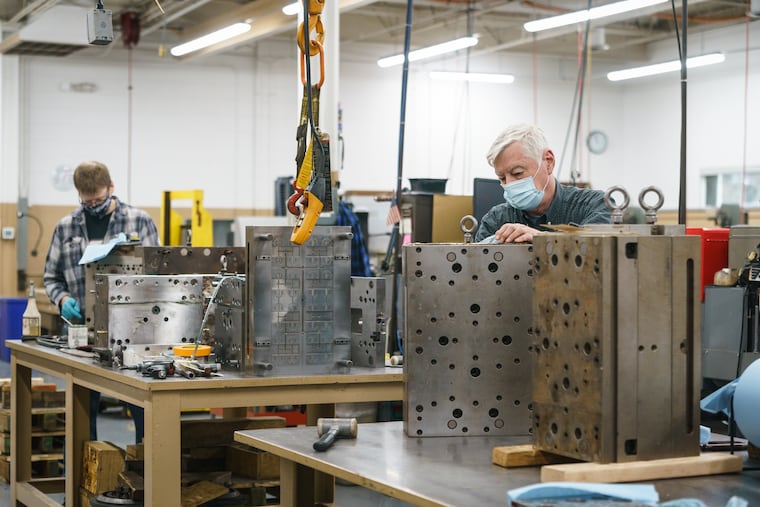Bringing back manufacturing | Business Weekly Newsletter
Supply chain bottlenecks renew interest in reviving U.S. manufacturing, and other stories.

The broken global supply chain has caused all sorts of shortages, from microchips to cream cheese to toys. The bottlenecks have helped increase consumer prices and sent businesses scrambling for goods. Some companies tried short-term fixes, such as hoarding supplies or paying more to ship items through the air.
The supply chain disruptions will likely lead to lasting changes, too. One idea is to bring manufacturers back to the U.S., keeping supplies closer to home. Our reporter Andrew Maykuth has the story on the renewed interest in reshoring efforts.
This is my last time writing the Business Weekly newsletter. I’m heading to Los Angeles for a new job and passing the baton to Ezequiel Minaya. He will continue to round up the best business stories each week, so sign up here to get this newsletter each week.
Thanks for reading.
— Christian Hetrick (@_Hetrick, businessweekly@inquirer.com)
Supply shortages and higher prices have renewed interest in bringing manufacturing back to the U.S. Some companies have already started: Intel announced plans to build “the largest silicon manufacturing location on the planet” near Columbus, Ohio. It’s a $20 billion investment to address the shortage of computer chips that are largely produced in Asia.
But reshoring factories won’t happen fast, and those that come back will likely require more automation, creating fewer jobs than the factories of old. For example, the Rodon Group was praised for shifting production of its K’nex toys from China to a plant in Montgomery County. To compete with overseas manufacturers using cheaper labor, Rodon invested heavily in automation and robotics, Maykuth writes.
Americans have also enjoyed more affordable overseas goods. But offshoring has led to the loss of American jobs, and the pandemic has shown the global supply chain carries some risks.
Read more about efforts to bring back U.S. manufacturing.
What else you need to know ...
Streaming services have raced to gain subscribers by bulking up their content offerings, mostly with vast libraries of on-demand movies and shows. But we’ve slowly seen more live TV make its way onto streaming. I recently wrote about the migration of live sports onto streaming apps such as Comcast’s Peacock.
Now, media companies are experimenting with local news. Starting last week, Peacock users can stream NBC10 without a cable subscription. NBC10 is one of four NBC-owned TV stations that launched on Peacock, alongside stations from Chicago, Boston, and South Florida. NBC10 is the second Philadelphia newscast to open up on their parent company’s streaming service (CBS3 is currently available to stream on Paramount+).
Peacock billed the new local news options as “24/7″ channels. But as our Rob Tornoe notes, there are some major limitations. Peacock’s NBC Philadelphia News channel is only live when NBC10 News is airing a new broadcast. Otherwise, users see a rerun. At one point Thursday morning, NBC Philadelphia News was streaming the 5 a.m. broadcast without noting it wasn’t live, so the newscast’s weather and traffic reports were two hours old.
Read more about NBC10′s launch on Peacock.
Other stories ...
Museum stores: The Philadelphia Art Museum has launched two new shops and overhauled its website as it makes a big play into retail.
Dueling lawsuits: Frequent-flyer miles and access to customer data are at the center of a dispute between American Airlines and the Points Guy, a travel website founded by a Bucks County resident.
New indictment: New Jersey’s U.S. Attorney’s Office indicted the owner of a defunct nursing home chain, including 10 in the Philadelphia area, for allegedly failing to pay $29.5 million in payroll taxes.
Launching 5G: Comcast has partnered with Nokia to sell businesses private 5G networks, the new high-speed wireless internet that could power ports, factories, and other large enterprises.
Pension reform: With PSERS under scrutiny, lawmakers met with officials of Pennsylvania’s public pension funds to vet measures that aimed to increase transparency and oversight.
The Big Number: 34,000 square feet
We’re planning to move: The Inquirer is negotiating a lease at 100 South Independence Mall West, often known as the Rohm & Haas building. The news outlet would occupy 34,000 square feet on the sixth floor of the property, about 60% less space than it currently rents at the former Strawbridge’s building at 801 Market St.
This follows similar decisions by other area companies, including drugmaker GlaxoSmithKline and weight-loss-products company Nutrisystem, which are also said to have signed recent deals for smaller offices. But analysts said it’s still too early to tell if this will be a long-term trend caused by the pandemic, which has emptied offices and pushed many employees to work remotely.